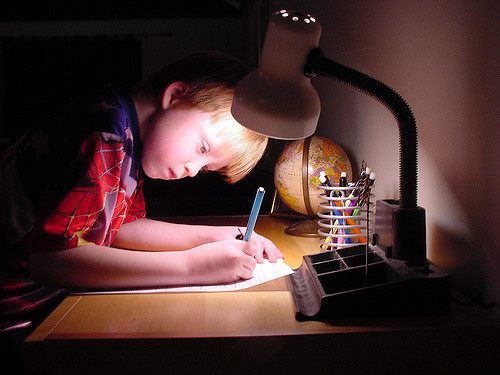Few kids actually enjoy doing homework. For some, however, it’s a task so arduous that when they aren’t spending hours avoiding it, they’re taking hours to get through it — even if it should only take 30 minutes.
Completing a task in a timely and efficient fashion is a valuable skill for kids, and it will serve them right into adulthood. They’ll be able to meet deadlines, avoid the frustrations that come with poor task-initiation, and have more time for other things — not only tasks and assignments, but hobbies and social activities. So how do we help the kids who take ten steps to do something when only three are needed? What can we do to make sure they’re prepared for the more serious projects in their futures?
Get ready to say goodbye to most of the tensions and anger that surround homework time… and your family’s weekday morning routine… and chore time… and bedtime. In this edition of the LearningWorks for Kids Beyond Games series we have a list of strategies for teaching a child to work efficiently.
Look for lulls. Pay attention to when a child is tired or lethargic. These are times when they may lack the mental energy to complete tasks like homework and chores and need help in getting energized before starting tasks. Observe their energy levels during the day and schedule homework or other difficult tasks during peak energy. Watch for chronic under-arousal that might indicate a sluggish cognitive tempo. If your child approaches everything in a very slow or sluggish manner, it could be a sign of Attention-Deficit/Hyperactivity Disorder.
Recharge their batteries. When your child is at a period of low energy but a task still needs doing, rituals and comforts can help them get moving. Background music, a cup of hot chocolate, or a change into comfortable clothing can be the boost they need to get started on a task. Conversely, taking a walk together or letting them outside for some free time by themselves can also help energize them. Teenagers in particular respond well to technological prompts, as in the use of smartphones for scheduling and alarms. Help them start using their personal digital assistants (Siri or Google Now) to keep track of assignments, lessons, and obligations.

An app like SuperBetter can help teach kids to work efficiently by gamifying task completion.
Reward system. It’s always nice to work toward a reward. When getting the task done isn’t motivation enough, it may help to schedule an appealing, fun activity to follow the things kids see as dull and boring. Reward them for starting homework assignments, projects, chores, and other tasks on their own with age-appropriate rewards (parental attention, video game time, or a special treat or privilege). Positive reinforcement helps create a sense of motivation so that children learn to start tasks on their own without procrastination. Letting them know their efforts will be appreciated as long as they try their hardest can help to reduce anxiety and the resulting confusion that may arise when it’s time to start a task. Talk to your child about what works best for them and encourage them to work toward their own goals, too. For an older child, try an app like SuperBetter, which allows you to create generic daily quests like “Complete a Project.” They’ll get points for completion, making homework or chore time more like a game.
The power of snacks. Highly nutritious snacks can boost morale and energy. Fresh fruit, granola bars, and other healthy munchies can be an important part of the homework routine. Look for signs that your child may be more susceptible than most to energy drops and mood swings when they are hungry, and counteract this with small, frequent meals and snacks.
Momentum. After a child successfully finishes a task, capitalize on their pride of accomplishment by helping them carry that momentum into the next thing. This can help them muster up the energy to start a new task that may look difficult to them. After your child successfully completes a task, help them carry that momentum into the next project. Get the cycle started by ordering their tasks from easiest to hardest. Give them something that can be done quickly, and easily, and then encourage them to start the next task so they can get that feeling again. If your child likes the feeling of crossing tasks off their list, an app like Boximize can help them get organized and improve time management skills, by allowing them to create voice notes and to-do lists.
Featured image: Flickr user Tim Pierce




